
If you've ever spent days on the trail, you know how important the appropriate footwear is. When you're hiking, your feet are doing most of the work, so it is important to have the proper equipment to protect them. When trying to protect their feet, most people focus on the boots. And let's face it, the right hiking boots can make a world of difference in your experience.
However, finding the best hiking socks for the weather conditions and terrain on your hike can protect your feet just as much as your shoes. In fact, sometimes socks can protect your feet and ankles from your boots. For example, you don't want to wear normal socks with your winter boots if you're hiking through snow, as doing so could cause blisters or other problems.
So whether you are an experienced hiker or planning your first adventure, the ACTIVE Reviews Team is here to guide you toward your best pair of hiking socks.
The Best Hiking Socks - Our Top Picks
By clicking on the product links in this article, we may receive a commission fee at no cost to you, the reader. Sponsorships and affiliate commissions help support our research so we can help you find the best products. Read our full affiliate disclosure here.
-
Best Overall Hiking Socks: Smartwool Classic Mountaineer Maximum Cushion Crew Sock
-
Best Hiking Socks for Women: Lululemon Power Stride Hiking Crew Socks
-
Best Hiking Socks for Men: Belega Blister Resist Crew Socks
-
Best Wool Socks for Hiking: Salomon X Ultra Hiking Crew Sock
-
Best Cotton Socks for Hiking: Bombas Calf Socks
-
Best Winter Hiking Socks: adidas Wool Terrex Cold RDY Wool Crew Socks
-
Best Summer Hiking Socks: Darn Tough Light Hiker Micro Crew Light Cushion Socks
-
Best Lightweight Hiking Socks: Feetures Elite Light Cushion Mini Crew Socks
-
Best Hiking Socks to Prevent Blisters: Thorlos Trekking Maximum Cushion Crew Socks
Why Trust Us?
ACTIVE.com's editorial team relies on the knowledge and experience of fitness and wellness experts including competitive athletes, coaches, physical therapists, nutritionists, and certified trainers. This helps us ensure the products we feature are of the highest standard. Collectively, the team has spent countless hours researching equipment, gear, and recovery tools in order to create the most accurate, authentic content for our readers. Customer satisfaction is also a key part of our review process, which is why we only feature products that are highly rated. More importantly, each member of our team is a fitness enthusiast. Fitness may be our job, but it is also our passion. Therefore, we strive to bring you products that we trust and would personally use.
How to Choose the Best Hiking Socks for You
Not all hiking socks are created equal. Most of them are designed for specific environments that you'll encounter on your hike, and since hiking socks aren't cheap, it makes sense to make it a priority to choose the right ones for you. Here are a few things to keep in mind.
Fabric
The fabric of a pair of hiking socks can be a good indication of what those socks are made for, and there are a variety of fabrics. Thin fabrics like polyester or nylon are light and breathable and they dry quickly if they get wet. On the other hand, thicker fabrics like wool keep your feet dry and warm. The fabric you choose will depend mostly on your personal preference and on the conditions of your hike, but your best bet is some combination of wool, nylon, and elastic/spandex.
Height
Many hiking socks come in multiple heights. Essentially, sock height is up to you. However, some factors to consider are how tall your boots are and whether you'll be trekking through something that could scrape your legs like tall grass. For example, it is possible to wear no-show socks with high-top hiking boots, but that could lead to blistering on your ankles. Most of the socks on our list are crew height, which means the top will sit just above normal hiking boots.
Cost
Hiking socks are specialty items and as such they can be expensive, particularly when compared to normal, everyday socks. But don't let the price tag put you off; many hiking socks are made with top-quality fabrics and their durability warrants the price.
Thickness/Cushioning
Hiking socks will typically have some indication of their level of cushioning. Cushioning in this sense refers to how thick the socks are. There is a scale, but to simplify, the lighter the cushioning on a given pair of socks, the more breathable they are. The heavier the cushioning, the more insulated and warm they will keep your feet. Sometimes, brands will wrap cushioning and thickness together, but when thickness is designated separately, it is referring to the fabric. Thicker fabric will fit tighter in your hiking boot.
Best Overall HikingSocks - Smartwool Classic Mountaineer Maximum Cushion Crew Sock
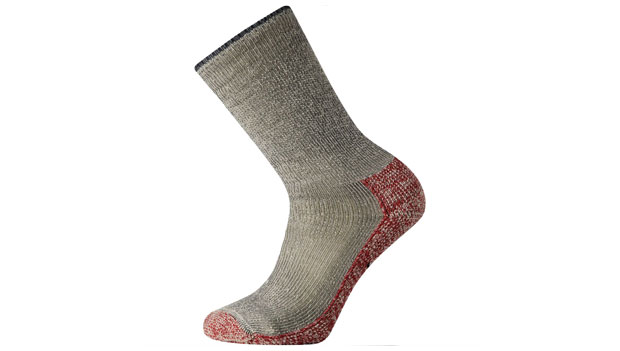
SPECS
- Material: 74% merino wool, 25% nylon, 1% elastic
- Height: Crew
- Thickness/cushion: Extra heavy
- Recommended uses: Extended hikes, backpacking, mountaineering
The Smartwool Classic is one of the thickest hiking socks you'll find on the market. This sock is great for serious hikes, multi-day backpacking trips, and even mountaineering expeditions. The Smartwool Classic will keep your feet warm in most conditions, is fairly priced, and has a two-year manufacturer warranty backing it up.
The philosophy behind the Smartwool Classic is harmony. These socks fill the space between your feet and your hiking boots to give you maximum protection from blisters and discomfort. If you're planning an extended hike, particularly one in colder climates, these socks could be a great option for you.
PROS
- Extra-thick wool provides warmth and natural blister protection
- Flat-knit seams keep socks from bunching
- 2-year warranty
CONS
- Only 2 color options
- Not breathable if you get too warm
BUY: Smartwool Classic Mountaineer Maximum Cushion Crew Sock
Best for Women - Lululemon Power Stride Hiking Crew Socks
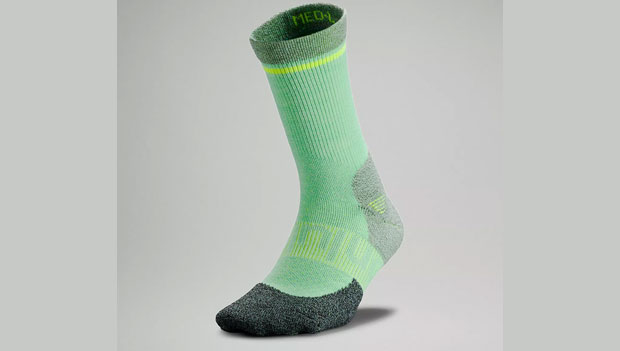
SPECS
- Material: 52% merino wool, 46% nylon, 2% elastic
- Height: Crew
- Thickness/cushion: Medium
- Recommended uses: Short hikes in moderate climate
Lululemon's Power Stride Hiking Socks are a great option for women who hike on the weekends. These socks are a blend of merino wool, nylon, and elastic that has cushioning from the arch to heel to help you stay comfortable on your hike. The elastic is woven throughout the sock which gives it a light compression for extra support.
One of the unique features about the Power Stride is that it has specific construction with an obvious left toe and right toe, which means you shouldn't have material bunching up in the corner of your hiking boots causing blisters. This sock is also ventilated despite the primary fabric being wool, so you should be able to use it in warmer climates.
PROS
- Right and left toe construction
- Ventilated
- Added cushioning under the arch and heel for support
CONS
- Color options are limited
- Limited size options
BUY: Lululemon Power Stride Hiking Crew Socks
Best for Men - Balega Blister Resist Crew Socks
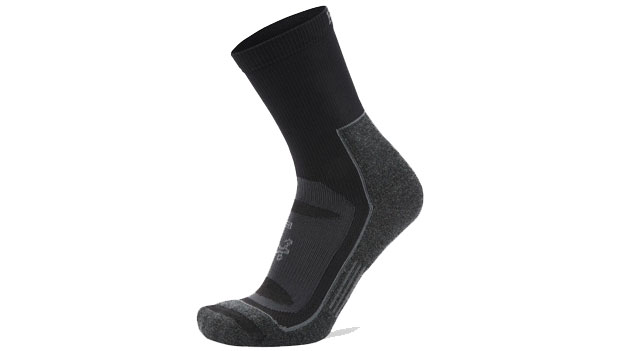
SPECS
- Material: 40%nylon, 28% Drynamix, 27% mohair/wool, 3% microfiber, 2% elastic
- Height: Crew
- Thickness/cushion: Ultra-high
- Recommended uses: Trail running, cycling, light hiking
The Balega Blister Resist sock is made to be resistant to sweat. The sock features Drynamix technology, which pushes moisture away from your skin, and also a mohair mix that blocks odor build up. The crew height on the sock falls a few inches above the ankle and the ultra-high cushioning offers maximum comfort.
The Blister Resist is different from other socks because it has a hand-sewn toe seam and an extra deep heel pocket for a secure fit. Those two features also address the most blister-prone areas of your foot so you can make sure you're keeping your feet in peak condition.
PROS
- Moisture resistant
- Odor resistant
- Deep heel pocket and hand-sewn toe seam to avoid blisters
CONS
- The extra cushion can make your feet too warm
- Sizes don't correspond to specific shoe sizes
BUY: Balega Blister Resist Crew Socks
Best Wool Socks for Hiking - Salomon X Ultra Hiking Crew Sock
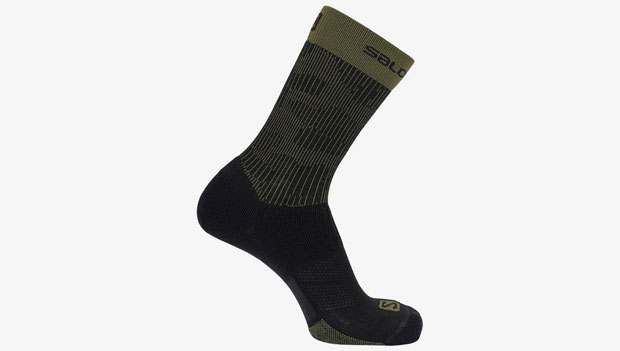
SPECS
- Material: 53% nylon, 45% merino wool, 2% elastic
- Height: Crew
- Thickness/cushion: Medium
- Recommended uses: Long-distance hikes in moderate climate
The Salomon X Ultra Hiking Crew Sock is one of the most versatile hiking socks on the market. The X Ultra is made of a combination of fabrics that offers compression support, breathability, and insulation all in one. Merino wool is a fabric you will see appear often while shopping for hiking socks and that's because it has all of the properties of traditional wool, but is thinner so it stays breathable.
The X Ultra has a mid-level height which means the elastic band hits a few inches above your ankle. It also has compression support to stabilize your muscles and joints, but it is a light compression. If you're on a long hike in a moderate climate, give the X Ultra a try.
PROS
- Light and breathable
- Compression support for your joints and muscles
- Uniquely cut to fit snugly
CONS
- Can get too hot in warm temperatures
- Can be too snug of a fit on wider feet
BUY: Salomon X Ultra Hiking Crew Sock
Best Cotton Socks - Bombas Calf Socks
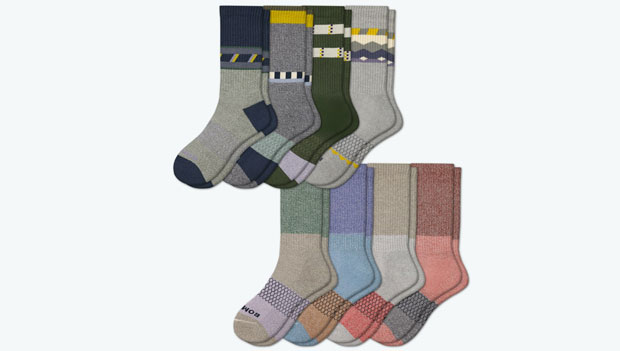
SPECS
- Material: 63% cotton, 30% polyester, 6% rubber, 1% spandex
- Height: Calf
- Thickness/cushion: Medium
- Recommended uses: Everyday walking, light hikes
OK, so the Bombas aren't technically hiking socks, but hear us out. Most hiking socks on the market will not be made of cotton because cotton isn't a very moisture resistant fabric. However, if you're the type of person who doesn't want to spring for socks you only use while hiking, these might be a good option.
The Bombas have some of the major characteristics of hiking socks—seamless toes, heel pocket stitched for support, and cushioning—but being made from cotton means they retain heat on your feet like wool and they won't look unprofessional like nylon. If you're looking for a sock that is versatile for everyday use and for short, non-strenuous hikes, give the Bombas a try.
PROS
- Many uses
- Many color and pattern options
- For every pair you buy, a pair is donated to a homeless shelter
CONS
- Cotton will retain moisture on extended hikes
- Not warm enough for colder temperatures
Best for Winter - Adidas Wool Terrex Cold RDY Wool Crew Socks
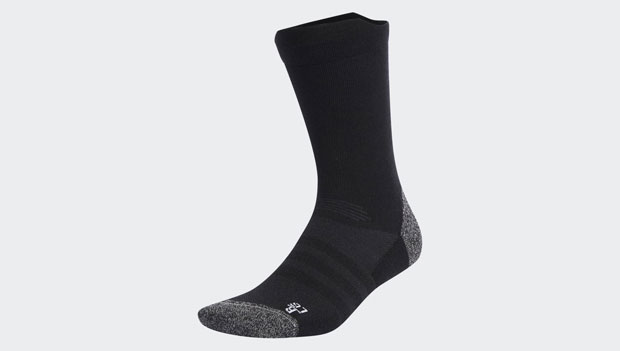
SPECS
- Material: 64% recycled nylon, 32% merino wool, 3% elastic, 1% recycled polyester
- Height: Crew
- Thickness/cushion: Half-cushioned
- Recommended uses: Road or trail running, moderate hikes
If you're going for a run, bike, or other endurance exercise in a cold climate, the Adidas Wool Terrex might be the right choice for you. This is not a sock designed to accompany you on extended hikes in the snow, but their combination of moisture resistance and warmth retention will work very well for winter races or trail runs.
This sock is unique because its fabric strikes a nice balance between expecting to sweat and wanting to stay warm. Will these socks be good for you if you're camping overnight in the cold? No. But if you're trail running, running or cycling in a race where it is cold, or going on a light to moderate hike in a cooler climate, these socks will get the job done.
PROS
- Fitted left and right toe for comfort
- Yarn stitched on the heel and toe to avoid blisters
- Recycled materials for sustainability
CONS
- Nylon-heavy fabric is not for extended hikes in the cold
- No color options
BUY: Adidas Wool Terrex Cold RDY Wool Crew Socks
Best for Summer - Darn Tough Light Hiker Micro Crew Light Cushion Socks

SPECS
- Material: 56% nylon, 40% merino wool, 4% spandex
- Height: Low Crew
- Thickness/cushion: Light
- Recommended uses: Backpacking, hiking
Darn Tough is a brand known for its quality. The Light Hiker is a low-cut sock that will be a good companion on your summer hikes. The fabric blend wicks moisture away as you sweat while keeping your feet comfortable inside your boots, while the height of the sock should be just above most average hiking boots to protect your ankles and legs.
Darn Tough takes a unique approach by using spandex as opposed to elastic in their fabric blend. This allows the sock to be much more breathable than socks with elastic throughout and around the top. The seamless design is also unique and should reduce any friction you would otherwise feel at the toes and heel.
PROS
- True seamless design reduces blisters and friction
- No elastic makes the sock extra breathable
- Soft and moisture wicking
CONS
- Odd color patterns
- Reviewers say the wool gets thick in some places on the sock
BUY: Darn Tough Light Hiker Micro Crew Light Cushion Socks
Best Lightweight - Feetures Elite Light Cushion Mini Crew Socks
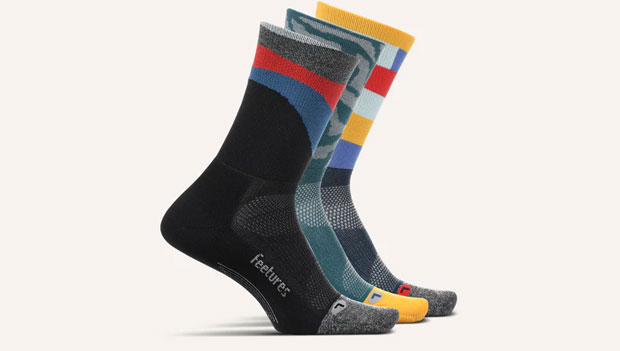
SPECS
- Material: 92% nylon, 8% spandex
- Height: Low crew
- Thickness/cushion: Very light
- Recommended uses: Day hikes, warm weather hikes
If you are looking for a sock that you barely realize is there, the Feetures Elite is for you. This sock is the lightest you will find in terms of thickness and cushion because its fabric contains no wool. The purely nylon and spandex mixture means the sock is as breathable as it gets without being barefoot, and it creates a moderate compression for support.
The Feetures Elite also has a seamless design which means there are minimal blister and irritation risks from friction with your boot. In fact, this sock is designed to give your feet maximum room inside of your boots, so if you like your boots tight and are worried a thicker sock will take up too much space, this sock could solve that problem.
PROS
- Very light and breathable
- Compression to eliminate blister risk
- No toe seams to avoid friction
CONS
- No added cushion for comfort
- Compression will be tight if you don't get the right size
BUY: Feetures Elite Light Cushion Mini Crew Socks
Best for Preventing Blisters - Thorlos Trekking Maximum Cushion Crew Socks
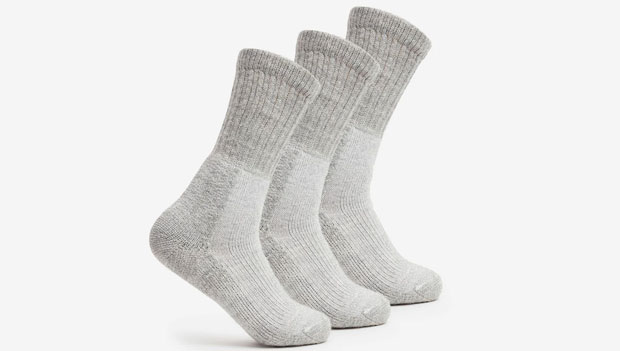
SPECS
- Material: 45% wool, 44% acrylic, 8% nylon, 3% elastic
- Height: Crew
- Thickness/cushion: Very thick, heavy cushion
- Recommended uses: Trekking, warmth
If you want a lot of cushion and a lot of warmth retention in a hiking sock, look no further than the Thorlos Trekking Maximum Cushion. As the name implies, the fabric blend is thick. The THOR-LON blend is proprietary to Thorlos and it features traditional wool, as opposed to the lighter Merino wool, and Acrylic which adds thickness.
These socks might be overkill for light to moderate hikes, but if you are going trekking, especially in cold weather, and want maximum blister prevention and comfort, they are a good option. Plus, Thorlos is made in the USA and the company has clinically tested their fabric's effectiveness to give you peace of mind.
PROS
- Very thick cushion and fabric protects your feet from blisters and friction
- Maximum heat retention
- Made in the USA
CONS
- Expensive
- The only color option is gray
BUY: Thorlos Trekking Maximum Cushion Crew Socks
FAQs About Hiking Socks
Which material is best for your hiking socks?
The most common answer to this question is wool. Hiking socks are different from normal, everyday socks because you need hiking socks to give you padding while keeping your feet safe from blisters and moisture. The best hiking socks have a blend of wool, nylon, and either elastic or spandex, but wool is a key component in almost any good hiking sock fabric.
Do hiking socks make a difference?
Having the appropriate socks to go along with your hiking shoes or boots can make a significant difference in your experience. A good pair of hiking socks will keep your feet from getting blisters or sores from friction with your hiking boots. Hiking socks are also good for keeping your feet comfortable on your hike by regulating temperature, wicking away moisture, and providing compression or padding.
Are running socks good for hiking?
Sometimes running socks are made with similar materials as hiking socks, particularly Merino wool and nylon fabric blends. If that is the case with your running socks, then you are probably safe to use them for hiking, too. However, if you have standard athletic socks that lack wool, then your best bet is to get a pair of hiking socks because hiking boots and running shoes create friction on your feet in different ways.
Are moisture-wicking socks good for hiking?
Moisture-wicking socks are breathable and dry quickly, which is a great quality for hiking. However, it really depends on your preference. If you're going on a short hike you probably won't notice a difference. However, if you're going on a moderate to extended hike, you will most likely want something that blends moisture-wicking fabrics with wool for maximum comfort.
Get ACTIVE on the Go


Couch to 5K®
The best way to get new runners off the couch and across the finish line of their first 5K.
Available for iOS | Android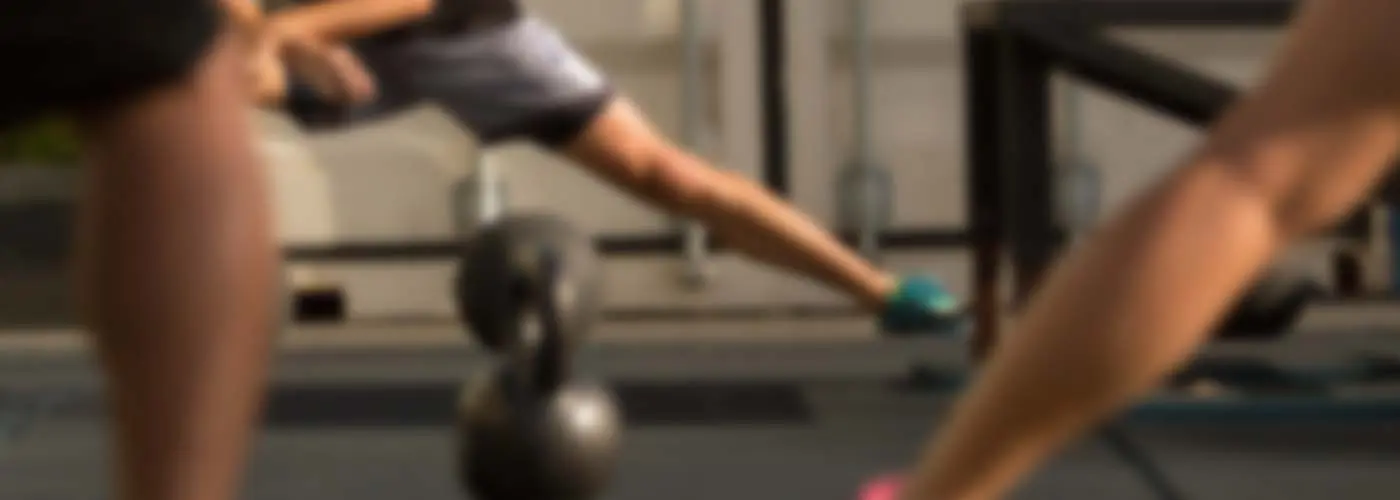
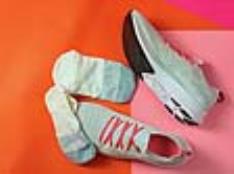

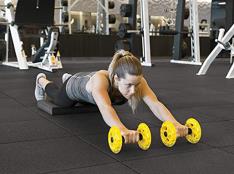


Discuss This Article